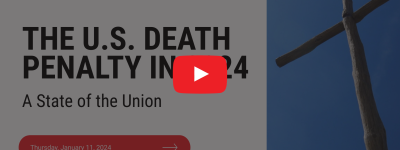Part I: God is the Giver of Life
Vicki Schieber
(Death Penalty and Discipleship, page 11)
For Reflection and Discussion: After listening to Vicki’s story, think about the strange ways of God. Amid Vicki’s suffering, she hears a call to serve. The call will help keep Shannon active for the good of the world. And this goodness has been a balm for Vicki.
Courtesy of Catholic Mobilizing Network
Click here to learn more about Vicki Schieber
Part II: Restorative Justice
Marietta Jaeger and Journey of Hope
(Death Penalty and Discipleship, page 18)
For Reflection and Discussion: In the following clip, Marietta engages in debate about the Bible. Reflect on the reasons given for each point of view—Marietta’s view that her stance is based in her faith, and her opponents’ view that their opinions are based on the Bible.
Courtesy of Students Against the Death Penalty
Learn more: To gain a deeper understanding of scripture and the death penalty, listen to Biblical scholar Dale Recinella.
Sam Milsap
(Death Penalty and Discipleship, page 21)
For Reflection and Discussion: In practical terms, many people hold that there should be no recourse to the death penalty if even one innocent person might be executed. One such person is Sam Millsap. As a district attorney in Austin, Texas (first elected in 1982), Sam successfully convicted several murderers and secured the sentence of death by lethal injection. After discovering that a few of those executed were innocent, Sam started to oppose the death penalty.
Courtesy of TEDx San Antonio
Learn more: Since 1973, 159 people and counting have been exonerated and freed from death row.
Part III: Responding to Evil with Good
Anthony Graves testifies at US Senate hearing
(Death Penalty and Discipleship, page 32)
For Reflection and Discussion: Reflect on Anthony’s description of life in solitary confinement. His testimony is passionate and troubling. Please thoughtfully consider Anthony’s final statement that “solitary confinement dehumanizes us all.”
Courtesy of the US Senate
Learn more: Explore the issue of solitary confinement with this reflective resource.
Teresa Hoffmann
(Death Penalty and Discipleship, page 36)
For Reflection and Discussion: Consider the stories of Theresa Hoffman and Vicki Cox, who have family members who were murdered. Through their experiences they found healing in forgiveness and in focusing on love for their loved ones rather than hate for the killer.
Courtesy of Kentucky Coalition to Abolish the Death Penalty
Vicki Cox
(Death Penalty and Discipleship, page 36)
Courtesy of Kentucky Coalition to Abolish the Death Penalty
Archbishop Gregory Aymond
(Death Penalty and Discipleship, page 39)
For Reflection and Discussion: View a video clip of Archbishop Gregory Aymond of New Orleans as he speaks about life issues in our day and why Catholics are encouraged to work for an end to the death penalty. Discuss Arch-bishop Aymond’s perspective on capital punishment as one of several issues in an ethics of life.
Courtney of the Archdiocese of New Orleans
Part IV: The New Evangelization
Bryan Stevenson
(Death Penalty and Discipleship, page 46)
For Reflection and Discussion: Bryan Stevenson is the executive director of the Equal Justice Initiative (www.eji.org). He and the EJI advocate and defend the poor and minorities in the justice system, where bias against them is well documented. In this video, Bryan tells the story of his life and work and offers information about injustices in our court system. After listening to his story, reflect on how the death penalty perpetuates injustices in our system of criminal justice.
Courtesy of TED
Next steps: Explore issues related to the death penalty in your state and learn what you can do to end this unjust practice.
Marietta Jaeger-Lane
(Death Penalty and Discipleship, page 54)
For Reflection and Discussion: View the following talk given by Marietta Jaeger-Lane as she discusses her struggles with forgiveness and hope. Reflect on her claim that capital punishment “desperately dis-appoints the families [of murder victims] and degrades, dehumanizes, and debilitates us as a society.”
Courtesy Montana Abolition Coalition
Next steps: Explore the concepts of restorative justice in your parish or community with this helpful workshop.



